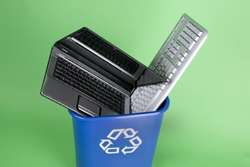Advances in recycling for the electronics sector

Research has addressed the mounting problem of polymers from the electronics sector entering the waste stream. An EU-funded research team investigated a fully recyclable polymer and have developed new moulding methods for components.
An alarming number of electronic goods composed of polymers with a very short lifespan enter the domestic waste recycling stream – mobile phones, digital cameras and laptop computers, for example. Consequently, introduction of the waste electrical and electronic equipment (WEEE) Directive has placed economic pressure on manufacturers to come up with appropriate recyclable materials for such products.
The 'Eco-efficient designs for end-of-life, anti-counterfeit electronic device recovery' (Separate) project worked on the water-soluble polymer polyvinyl alcohol as one possibly suitable material. Non-toxic and biodegradeable, polyvinyl alcohol is a polymer where the degree of hydrolysis, hence the number of units and the molecular weight determines the processability.
The Separate team found that a polymer, PVAXX, can be dissolved in 30 seconds using a batch dissolution process and can be speeded up using ultrasonics. Moreover, the polymer can be reused and injection moulded without significant loss of properties.
A novel over-moulding technology was developed using the polymer and fully encapsulated modules for a smart card application were produced. The team also developed semi-encapsulated electronic components for a contact and non-contact smart card, a memory stick and a calculator case.
Separate deliverables were industrially validated. A robotic simulation of the injection moulding, handling and subsequent testing of the memory sticks was developed. To study the industrial scale, another simulation using a counter current washing principle was chosen to minimise water and energy use.
The impact of Separate technology will be a decrease of the amount of electropolymeric waste discarded in Europe. As a result, there will be less organic pollutants and heavy metal water pollution.
Provided by CORDIS


















